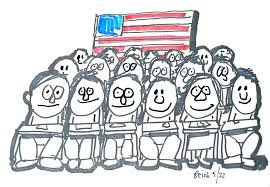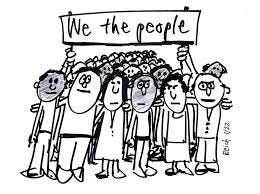Did student protesters affect Biden’s decision?
Friends,
This weekend, tens of thousands of students are graduating from American colleges and universities. Some graduation ceremonies have been cancelled or at least inconvenienced by student protests.
Just so there’s no confusion, let me state clearly that I’m deeply opposed to Hamas. I was appalled by the atrocities it committed on October 7 that left 1,200 Israelis dead and took 134 people as hostages, including babies, children, women, and older people. And I firmly believe in Israel’s existence and its right to protect itself.
As to the protests now roiling universities, I disapprove of violence. I utterly condemn antisemitism. I’m also aware that, like any student protest movement, this one has included some excesses, mixed motives, and just plain ignorance.
But after speaking with students from Berkeley to Columbia and points between, I’m clear that the core purpose of these protests has been to condemn Israel’s disproportionate response to Hamas’s October 7 atrocities — a response that has caused the deaths of upwards of 34,000 residents of Gaza so far, most of them women and children. And to oppose America’s complicity in those deaths.
In this respect, student protesters this week achieved a small but significant victory.
On Wednesday, President Biden said he would not supply offensive weapons that Israel could use to launch an all-out assault on Rafah — the last major Hamas stronghold in Gaza — over concern for the well-being of the more than 1 million civilians sheltering there. In an interview with CNN, Biden said that if Israel goes into Rafah, “We’re not going to supply the weapons and artillery shells used.”
His threat to hold up artillery shells expanded on earlier revelations that the U.S. was going to pause a shipment of heavy bombs.
Biden also acknowledged that “civilians have been killed in Gaza” by the type of heavy bombs that the U.S. has been supplying. It was the first explicit validation of what administration critics have been loudly protesting, even if he still stopped short of taking responsibility.
Since Wednesday, Israel has expanded its military operation in Rafah. Biden must continue the pause on supplying Israel offensive weapons.
Biden’s decision was better late than never. Until last week, he hadn’t drawn a line that Israel must not cross, nor did he put the military might of the United States behind enforcement of that line. Now, he has.
What brought him to this moment?
It is always risky to presume cause and effect when it comes to American foreign policy, especially in the Middle East. Biden has been feeling pressure from many directions.
He has had to weigh the interests of Israel, America’s strongest ally in the region — an ally with deep roots in the United States. He has had to consider Israel’s right to protect itself from Hamas.
But Biden is also is a compassionate man, and I’m sure he has been deeply upset by the carnage in Gaza. In addition, Israeli Prime Minister Benjamin Netanyahu has repeatedly refused to listen to Biden’s entreaties — first, not to attack Gaza, then not to occupy Gaza, then to allow humanitarian aid to Gaza, then not to attack Rafah. For months now, Netanyahu has been thumbing his nose at the president of Israel’s most powerful ally.
Prior to the student protests across America, Biden felt very little domestic pressure to stop supplying Israel with offensive weapons and bombs. Had there been no student movement against the war in Gaza, I doubt Biden would have reached the point he did last week.
I have served three presidents. I got to know two of them and see them in action up close. I have a fairly good understanding of how decisions are made in the West Wing.
Widespread student protests do not directly affect public policy, and never have. Presidents and their staffs believe they and the work of the government should be impervious to young expressions of outrage.
But if those protests escalate and spread, and reflect deeply held moral conviction, they attract public attention. They convey moral urgency. They can thereby galvanize and sometimes reframe a national debate. They can even affect elections.
And these consequences do affect policy.
Protests caused Lyndon Johnson and Congress to hasten work on civil rights and voting rights. Later, they pushed Richard Nixon to end the Vietnam War. More recently, they contributed to Joe Biden’s leadership on reversing climate change.
I remember February 1, 1960, when four Black college students sat down at a lunch counter at Woolworth’s in Greensboro, North Carolina, and politely asked for service. Their request was refused. When asked to leave, they remained in their seats.
Hundreds more students joined. The Woolworth protest continued for six months. It ultimately led to the desegregation of the F. W. Woolworth lunch counter on July 25, 1960. That protest helped ignite a student-led movement across the South to challenge racial inequality. It also affected the nation. It influenced the Kennedy administration’s Justice Department and fueled the Civil Rights Movement.
Protests always cause some inconvenience. They can stir anger. A great uncle of mine was so affronted by the “Greensboro four” that he asked me, “Why did they have to cause so much trouble?” and complained, “They’re interfering with private property!” I told him that causing trouble and interfering with private property were sometimes necessary to stop injustice.
We may never know the exact connections between the student protests and Biden’s decision last week to stand up to Bibi, but I am sure they have had an impact.
Happy graduation to all those who have earned their diplomas and certificates, even if their ceremonies have been cancelled.



Because of your own biases You are still not totally recognizing that most of these protests have been instigated by outside agitators for Hamas who don’t care about the gazans but ultimately want to destroy democracy. I am glad to see you are finally acknowledging a few truths.
I too will state I do not agree with what natanyahu is doing however I am tired of no one holding Hamas to blame for gazan conditions and for lack of a hostage/ cease fire agreement. They are playing games and no one is holding them accountable
I do think that the student protests have had an effect on President Biden‘s decision to withhold some armaments from the Israeli defense forces. But more importantly, I see this as a sign of the students finally waking up and realizing that they have power. History has shown, that the strength of protest movements often start on the college and university campuses and then spread to the general population. Personally, I applaud that the students are waking up however, the nation protest movement will need clearheaded leaders and guidance from those of us who have had experience in the past.